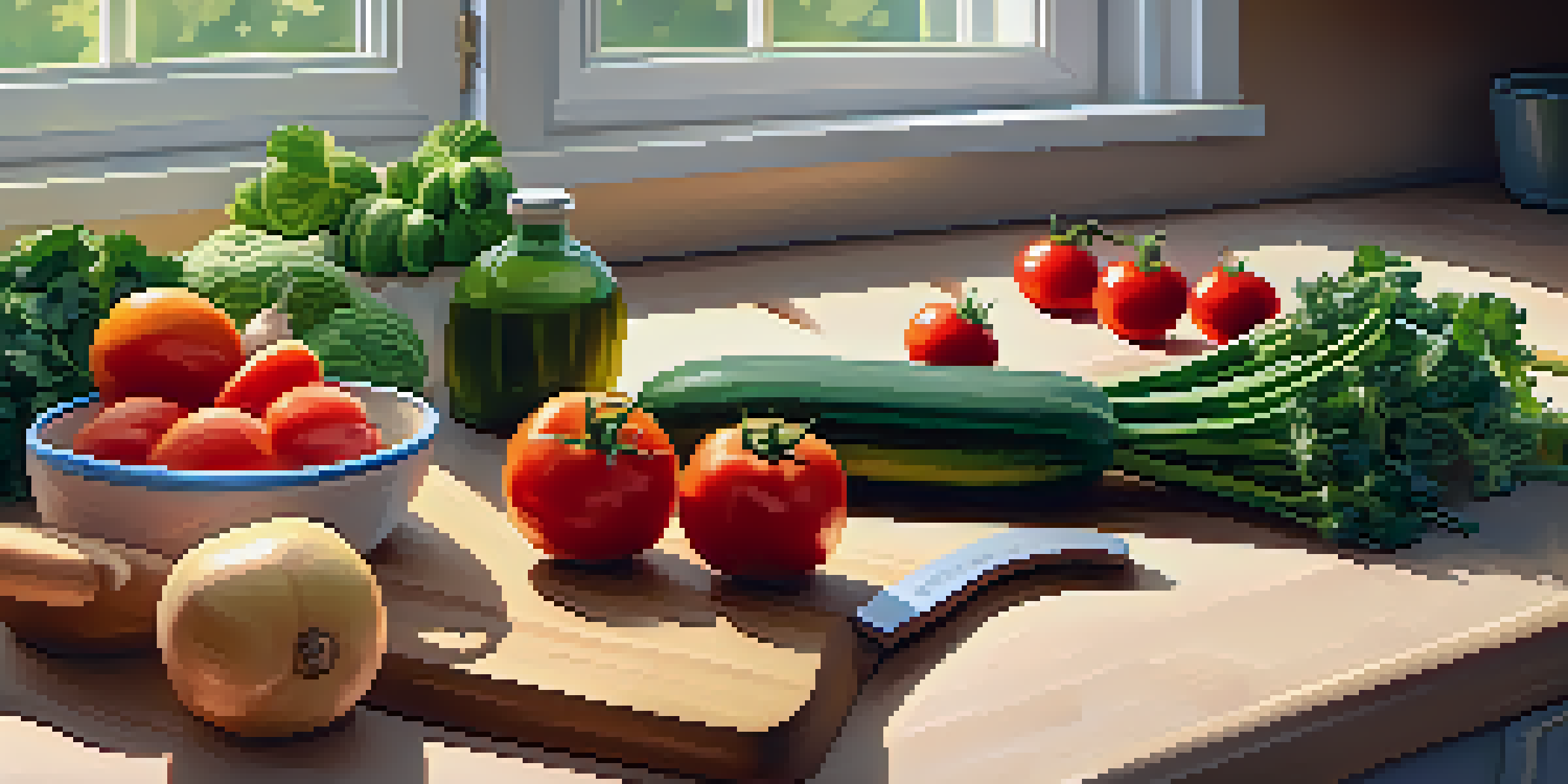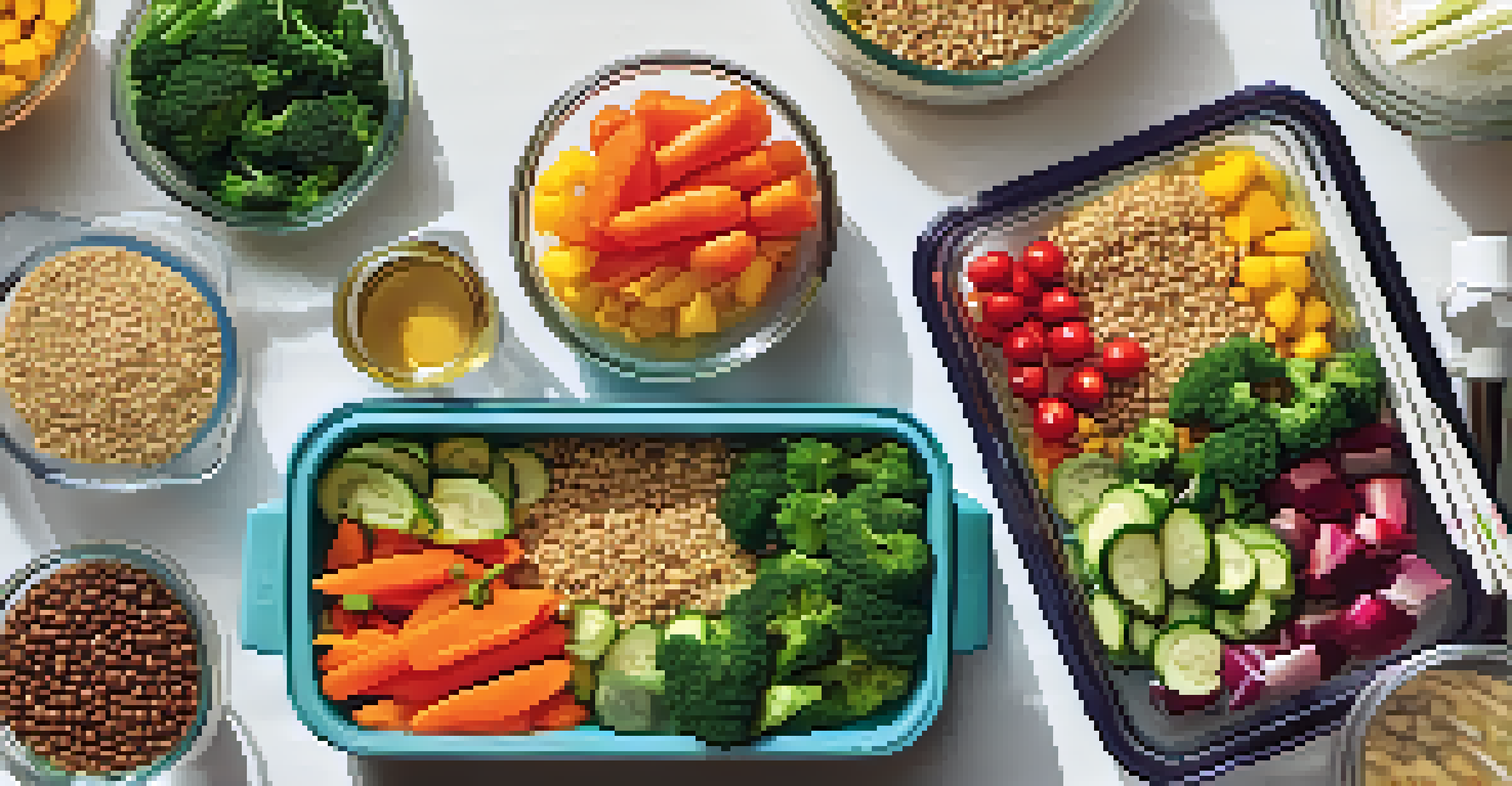How to Plan Vegetarian Meals to Minimize Waste

Understanding Food Waste in Vegetarian Cooking
Food waste is a significant issue that affects the environment and our wallets. In vegetarian cooking, while we often focus on healthy ingredients, it's easy to overlook how much we throw away. Being aware of this waste is the first step in creating a more sustainable cooking approach.
Waste is a terrible thing to waste.
Statistics show that nearly one-third of food produced globally is wasted. This includes fruits, vegetables, grains, and other plant-based ingredients that are often discarded due to spoilage or improper planning. By understanding the scope of the problem, we can make conscious decisions to minimize waste in our own kitchens.
Moreover, reducing food waste not only benefits the planet but also allows us to get the most out of our grocery budgets. With a few strategic changes in our meal planning, we can enjoy delicious vegetarian meals while being kind to the Earth.
Creating a Flexible Meal Plan
A well-structured meal plan is essential for minimizing waste. Start by assessing what you already have in your pantry and fridge before making a shopping list. This way, you can utilize ingredients that might otherwise go bad, helping to cut down on waste right from the start.

When planning meals, consider recipes that share common ingredients. For instance, if you buy a bunch of kale, plan to use it in salads, soups, and smoothies throughout the week. This approach not only reduces waste but also adds variety to your meals, keeping them exciting and flavorful.
Minimize Waste with Meal Planning
Creating a flexible meal plan helps utilize ingredients effectively and reduces food waste.
Flexibility is key. If you notice certain ingredients nearing their expiration date, be ready to adapt your meal plan. Having a few versatile recipes on hand can help you pivot and make the most of your ingredients without feeling restricted.
Shopping Smart to Reduce Waste
When it comes to grocery shopping, being strategic can significantly reduce waste. Start by making a list based on your meal plan, and try to stick to it. This prevents impulse buys that might go unused and eventually spoil in your fridge.
The greatest threat to our planet is the belief that someone else will save it.
Consider shopping at local farmers' markets or bulk food stores where you can buy only what you need. This not only supports local agriculture but also allows you to purchase loose produce without excess packaging, which often contributes to waste.
Another tip is to invest in reusable produce bags for fruits and vegetables. These bags are not only eco-friendly but also help you avoid single-use plastic, making your shopping trip more sustainable overall.
Proper Storage Techniques for Fresh Produce
How you store your fruits and vegetables can have a major impact on their shelf life. For instance, some produce, like apples and bananas, can spoil quickly if stored together. Research the optimal storage conditions for different types of produce to ensure they stay fresh for as long as possible.
Using airtight containers can help keep leafy greens crisp and prevent them from wilting. Likewise, freezing excess fruits and vegetables is a great way to preserve them for later use. Just remember to label your containers with dates to keep track of freshness.
Smart Shopping Reduces Waste
Making a shopping list and choosing local produce can significantly cut down on food waste.
Additionally, consider utilizing your freezer for meal prep. By preparing batch meals and freezing them, you not only save time but also ensure that ingredients don’t go to waste. This method allows you to enjoy home-cooked meals without the stress of daily cooking.
Utilizing Leftovers Creatively
Leftovers can be a fantastic way to minimize waste and save time. Instead of thinking of them as yesterday's meal, get creative! Leftover roasted vegetables can be tossed into a stir-fry, blended into a soup, or added to a frittata.
Consider setting aside a designated day each week for using up leftovers. This could be a 'clean-out-the-fridge' night where you experiment with different combinations. Not only does this reduce waste, but it can also lead to delicious, unexpected meals.
Another idea is to repurpose ingredients. For example, if you have leftover rice, turn it into a veggie fried rice dish or a rice salad. By thinking outside the box, you can keep meals exciting while making sure nothing goes to waste.
Incorporating Seasonal Ingredients
Seasonal ingredients are not only fresh and flavorful, but they also help to reduce waste. When you eat what's in season, you're more likely to enjoy peak flavors and support local farmers, which can lead to less food being transported and wasted.
For instance, in the summer, zucchini and tomatoes are abundant. Planning meals around these ingredients means you're more likely to use them before they spoil. This seasonal approach encourages variety and keeps your diet interesting throughout the year.
Get Creative with Leftovers
Transforming leftovers into new meals is a delicious way to reduce waste and save time.
Additionally, buying seasonal produce often comes at a lower cost. This not only helps you save money but also aligns with sustainable practices, making it a win-win for your wallet and the planet.
Educating Yourself on Food Waste Solutions
Lastly, educating yourself about food waste solutions can empower you to make informed decisions in your kitchen. There are countless resources available, from blogs to documentaries, that focus on reducing waste and promoting sustainable cooking practices.
By learning about the impact of food waste, you can take actionable steps to create a more sustainable kitchen. Familiarizing yourself with concepts like composting or food donation can also inspire you to find new ways to lessen your environmental footprint.

Engaging with your local community can also yield great insights. Workshops and events focused on sustainable cooking not only provide valuable information but also connect you with like-minded individuals who share a passion for reducing waste.